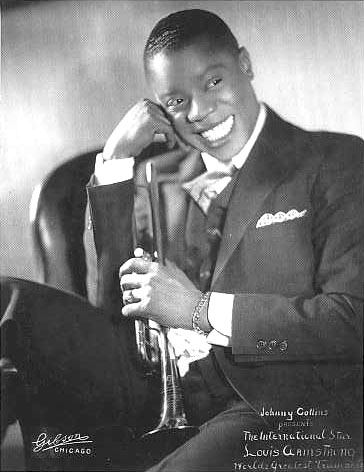
Louis Armstrong, 1933. Photo in public domain.
Cornet giant Warren Vaché Jr. and master acoustic guitarist, singer and raconteur Marty Grosz join The Jim Cullum Jazz Band for a biographical tribute to the genius of Louis Armstrong. This radio show, broadcast live on July 2, 1989, kicks off with a Louis Armstrong original from 1926 “Potato Head Blues,” then heats up with the Spencer Williams classic “Fireworks.”
Louis Armstrong always said that he was born on the 4th of July in 1900. Though it was later disproven by baptismal records, it made a good story and he stuck to it. Louis lived with his family in a run-down wooden shack in New Orleans’ back o’ town Third Ward. His father left early on, leaving Louis and his mother and sister to fend for themselves. It was a hard life with bad characters and bad times all around in a neighborhood so rough it was known as “The Battlefield.” Black Benny, one of the toughest characters on the street, was a big man and strong; he always carried a .44. Louis Armstrong later said that Black Benny had a soft spot in his heart for street kids and looked after them. He especially liked Louis, and was always on hand to throw a few pennies in the hat when Louis and his pals sang and danced on the street for him. As a boy, Louis drove a coal wagon for the Karnofsky family, selling coal to Storyville prostitutes. He’d drive the wagon calling to the ladies standing in the doorway, “stone coal, ladies, five cents a water bucket.” He loved going over to Storyville because that’s where the music was.
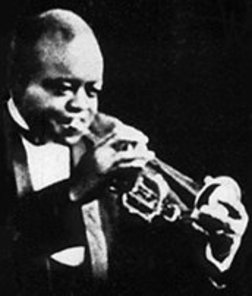
New Orleans Trumpet Legend Joe ‘King’ Oliver. Photo courtesy legendsofjazz.
His favorite music came out of Pete Lala’s Cabaret where Joe “King” Oliver played; everyone knew he was the best. Louis was too young to go into the club but sometimes he would get to deliver a load of coal to the prostitute who lived next door to the cabaret. He would unload the coal slowly and quietly so that he could listen to the music through the walls. Then he would stand there listening, until it would dawn on the lady that he was still there, and she’d say, “What’s the matter with you, boy? This is no place to daydream; I’ve got my work to do.” He’d go home, happy just having a chance to hear his idol play.
On New Year’s Eve, 1912, Louis was 12 years old. On a dare, he borrowed his stepfather’s revolver and fired six shots into the air to celebrate the moment. Police nearby took him off to jail in handcuffs, and he wound up in the Colored Waifs’ Home for Boys with an indefinite sentence. Things actually turned out well for Louis at the Waifs’ Home. The Director and Warden were amateur musicians, and for good behavior the Warden gave Louis the honor of playing Reveille, Taps and Mess Call on the bugle. Louis practiced every chance he got until he could play them perfectly. He moved up to the cornet and became leader of the marching band.
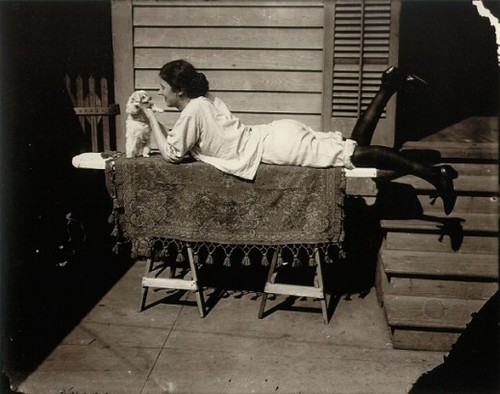
Streetwalker, New Orleans, 1912. Photo By John Bellocq.
On stage at The Landing, Warren Vache, Jr. and Marty Grosz step up to the microphones with The Jim Cullum Jazz Band on “Chicago Breakdown,” a number composed by Jelly Roll Morton and famously recorded by Louis Armstrong and his Stompers in 1927, the ensemble Armstrong was playing with, at the time, at The Sunset Café in Chicago’s South Side. Then Cullum Band guitarist Howard Elkins takes the vocals on another Armstrong original “S.O.L. Blues.”
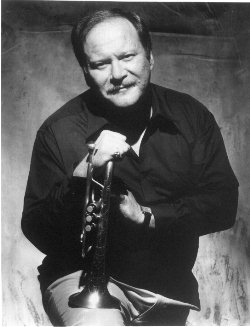
Warren Vaché Jr. Photo courtesy of the artist.
.jpg)
Marty Grosz. Photo courtesy of the artist.
One day, the kids from the Waif’s Home marched in a parade up to Louis’ old back o’ town neighborhood. On the corner of Liberty and Perdido, playing their hearts out on their beat-up old instruments, Louis looked up—and there was Black Benny. Benny waved at him and grabbed the cap off of Louis’ head, passed it around to the street gang of gamblers and pickpockets and prostitutes who had practically raised Louis. Armstrong told the story that Black Benny gave Louis his cap back full of money—enough dough to buy every boy in the band a brand-new instrument, and band uniforms, too. Overnight Louis became the most popular kid in the Waifs’ Home. (If the story sounds too good to be true, it probably is, but it illustrates the vivid optimism Armstrong radiated throughout his life.) Released from the Waifs’ Home, Louis began playing his horn in honky tonks, in marching bands and for funerals parades around Storyville. His solos stood out and bandleader Joe Oliver took notice, and befriended the young musician.
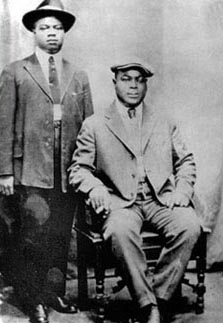
Louis Armstrong and Joe Oliver. Photo courtesy neajazzintheschools.org.
In the early 20s Joe “King” Oliver was a hot ticket at the Lincoln Gardens on Chicago’s South Side. Louis had just turned 22 when Oliver wired down to New Orleans asking him to join his Creole Jazz Band up north. Louis could hardly believe it. He said he “jumped sky-high with joy” getting that telegram from Oliver. Louis packed his clothes and caught the train to Chicago. It was 11:00 PM as his train pulled into the station, but there was no one there to meet him. A country boy in the big city, Armstrong had to figure out how to get a cab to the Lincoln Gardens Cafe.
Oliver’s band was playing a red-hot number as Louis’ cab pulled up in front. The sound of their music sent a cold chill up Louis’ spine. He said, he wondered if he was good enough to play with such a great band. He thought about going back home but he’d come this far, so he went inside and struggled up to the bandstand. King Oliver saw him coming up to the stand and he stopped the music and called out to him, “Boy, where have you been? I’ve been waiting and waiting for you.”
“If We Never Meet Again” and “Swing That Music” are two classics Armstrong composed with Horace Gerlach in the mid-1930s; these popular numbers helped Armstrong break through to mainstream audiences with his music. Here Warren Vache, Jr. and Marty Grosz join The Jim Cullum Jazz Band live from The Landing.
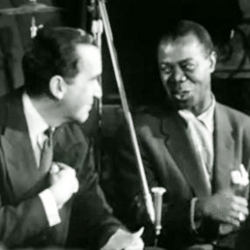
Photo of Edward R. Murrow and Louis Armstrong courtesy prorevnews.blogspot.
On this broadcast, Louis Armstrong is featured in an historical recording of an interview with the storied journalist Edward R. Murrow, captured for CBS television in the 1950s. Among other exchanges Murrow asks Louis, “What’s the meaning of a ‘cat?’” Louis replied, “A cat can be anybody, from the guy in the gutter or to a lawyer, doctor, or the biggest man to the lowest man, but if he’s in there with a good heart, enjoying the same music together, he’s a cat then.”
Special guest Marty Grosz pays tribute to Louis Armstrong’s many movie appearances with the comedic number “The Skeleton in the Closet” from the 1936 Bing Crosby movie Pennies from Heaven. Jim Cullum and guest Warren Vaché team up on a sizzling 2-cornet rendition of the Hot Five classic, “Tight Like This.”
Photo credit for Home Page: Edward R. Murrow and Louis Armstrong courtesy prorevnews.blogspot.
Text based on Riverwalk Jazz script by Margaret Moos Pick © 1989

